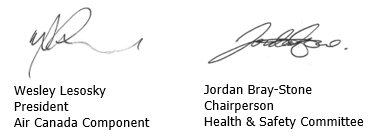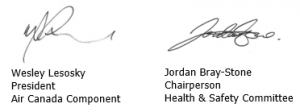The Union met again with the PHAC on September 23, 2020. We wish to provide an update about our ongoing work to resolve denial of services for our members and emails/calls from quarantine enforcement agents.
Denial of services:
The PHAC raised this issue on September 18, 2020, at the Health Professionals Forum, a group of the professional associations and colleges in the healthcare sector that meet throughout the year with senior government officials. They were asked to come back with suggestions about how to best resolve this issue. The PHAC will be following up with them this week. A call is being scheduled between the PHAC and provincial health agencies to explore a similar conversation.
Meanwhile the Union heard from its members that it would be helpful to have a letter from the company confirming the exemption and the measures in place to protect employees from COVID-19. We requested that the company issue such a letter and are pleased that one is now available. This will be posted on Aeronet shortly.
Concerns about email Scams:
The Union has advised the PHAC that many members have been unsure if the emails they receive are legitimate or not. The agency is reviewing this internally.
The PHAC advises that any legitimate emails from their agency will be sent from an address ending in @CANADA.CA . You should ensure that the word “Canada” is spelled correctly as scammers will often add or subtract a letter in order to make the email appear legitimate.
The federal government also maintains a website with information about all known COVID-19 fraud and scams:
https://www.canada.ca/en/public-safety-canada/campaigns/covid19.html#h-1
How to stop quarantine enforcement emails/calls:
The PHAC and CBSA have reviewed their data and the bulk of the problem lies with the use of the paper form. These forms are processed along with thousands from passengers. If the section related to your exemption isn’t circled or the processing agent misses it, your name will be forwarded to the PHAC’s quarantine enforcement branch.
To reduce emails/calls, it is highly preferable to use the CBSA’s ArriveCan app, which has recently been fixed.
- Download the ArriveCan app for free on Google Play and Apple App Store .
- Create a profile on the app. This will be saved for future use.
- Complete the quarantine questionnaire using the app upon return from your flight.
- Show your submission receipt to the CBSA officer. They will provide you with a 3-digit code.
- Once you enter the 3 digit-code into the appropriate box, your exemption from the mandatory quarantine provision is confirmed by a blue E with a checkmark.


If you choose to complete the paper form, the PHAC advises it is more likely your name will end up on the quarantine enforcement email/call lists. To reduce those chances, they advise the following:
- Fill out the following highlighted fields (see below)
- Under Type of Travel document, write Passport
- Under Type of exempt travel, clearly circle Trade or transport services.
- Remind the customs officer as you pass through that you need to be processed as EXEMPT for trade or transport services.

If you start getting emails/calls from quarantine agents:
- Don’t ignore them. This may cause the agent to escalate your file.
- When you speak to the agent use the language that you are exempt from the quarantine due to work in transport services.
- Let them know that you are in possession of a letter issued by Transport Canada to the CEO of Air Canada confirming this exemption (ePub>Covid-19 bulletins).
- The PHAC has worked with their enforcement department to ensure that calls won’t escalate, however take note that the agent cannot remove your name from the list. This must be done by contacting the agency that flagged you (CBSA).
- CBSA can be reached as follows:
- contact@cbsa.gc.ca or 1-800-461-9999
- Ensure to state your name, employer (AC/Rouge), occupation (cabin crew), flight date and number, and the fact that you are receiving quarantine enforcement calls despite being exempted due to work in transport services.
If a law enforcement officer presents themselves at your residence:
The Union, PHAC and CBSA are all aware that a small number of our members have received enforcement visits from the Police. It appears that some officers are unaware of our exempted status. The Union, PHAC and CBSA are collaborating to resolve this.
In the meantime, please ensure to have your TC and company exemption letter handy as well as your employee ID.
It is extremely important to notify the union of any such occurrence so we can continue our efforts to resolve this on behalf of the membership.
In Solidarity,






